Clifford Garstang's Blog, page 147
October 5, 2010
Prime Number Magazine--update 2.7
 Have I mentioned that Prime Decimals 2.7 is now live at Prime Number Magazine? That's the 4th and final update to Issue No. 2, our debut issue. 2.7 features poetry by Donna Hunt, Harry Calhoun, and Donna Vorreyer; nonfiction by Donna Steiner; and fiction by Tiff Holland and Meg Pokrass.
Have I mentioned that Prime Decimals 2.7 is now live at Prime Number Magazine? That's the 4th and final update to Issue No. 2, our debut issue. 2.7 features poetry by Donna Hunt, Harry Calhoun, and Donna Vorreyer; nonfiction by Donna Steiner; and fiction by Tiff Holland and Meg Pokrass.Stay tune for Issue No. 3, which should appear two weeks from today, on October 19.
Published on October 05, 2010 10:23
October 4, 2010
The New Yorker: "The Dungeon Master" by Sam Lipsyte
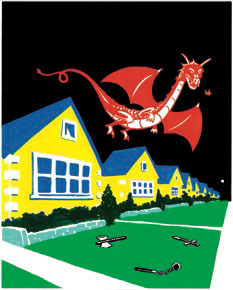 A bunch of kids are play Dungeons & Dragons after school (at least I guess that's what this is—having never played the game, I don't know if the description of the game is right or if the author has come up with something new) at the home of the "Dungeon Master," a boy who seems a bit disturbed, although it could be nothing more than having grown up without a mother. The narrator is a shy boy on the periphery who eventually gets fed up with the Dungeon Master (the broken wrist the DM causes could have something to do with it) and moves on.
A bunch of kids are play Dungeons & Dragons after school (at least I guess that's what this is—having never played the game, I don't know if the description of the game is right or if the author has come up with something new) at the home of the "Dungeon Master," a boy who seems a bit disturbed, although it could be nothing more than having grown up without a mother. The narrator is a shy boy on the periphery who eventually gets fed up with the Dungeon Master (the broken wrist the DM causes could have something to do with it) and moves on. But the DM doesn't move on, lives in his fantasy world, and hints at a future suicide. Other kids in the group are also pretty marginal—one kid who is a thief in the game turns out to be a thief in real life.
Is there a point here? Is it that we—meaning the parents of impressionable kids—need to keep closer watch? Because it does seem to me that the Dungeon Master's father could have been doing a better job with him, and the narrator's parents aren't so hot either. But, really, is that the point?
On the one hand, this story seemed far more readable than anything else I've read in The New Yorker lately. But I think it only appeals in a relative sense. My standards for this magazine have fallen.
October 4, 2010: "The Dungeon Master" by Sam Lipsyte
Published on October 04, 2010 18:16
Nobel Prize week
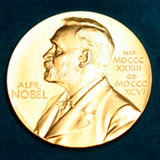 It's Nobel Prize week, with the prizes doled out one-a-day, like vitamins. Today was the announcement of the inner in medicine. Tomorrow we get physics, Wednesday is Chemistry, Thursday is Literature, Friday is Peace, and then we have to wait until Monday for Economics (can they give it to Paul Krugman again?) Check out all the action at Nobelprize.org
It's Nobel Prize week, with the prizes doled out one-a-day, like vitamins. Today was the announcement of the inner in medicine. Tomorrow we get physics, Wednesday is Chemistry, Thursday is Literature, Friday is Peace, and then we have to wait until Monday for Economics (can they give it to Paul Krugman again?) Check out all the action at Nobelprize.orgThe only one I'm really interested in (although Peace is nice), is literature. I'll be traveling on Thursday, so I won't be on top of it, but would anyone like to hazard a guess as to the winner? I have no idea, but apparently the bookies are favoring poetry this year (see Poet tipped in Nobel Prize for Literature). I don't think anyone really has a clue.
Published on October 04, 2010 06:14
The MFA needs a splash of MBA -- guest post by Cameron Conaway
That's right.
MFA (Master of Fine Arts) students often joke about how the degree they are attaining is at the opposite end of the spectrum from the MBA (Master of Business Administration). They joke about how MFA and MBA students have different morals – one pursues the craft and love of an art regardless of the money it may bring in. The other, they say, is in pure pursuit of what typical MFA students couldn't care less about – money.
I'm not laughing. It's this pious, holier-than-thou attitude that makes aspiring, talented writers go unpublished. In fact, I've been told by one professor, "Do not attempt to publish anything during graduate school – not even a single poem here or there in a literary magazine. Your entire focus should be on becoming a better writer."
Bull. Part of becoming a better writer is becoming a better representative of your writing. The field of writing is every bit as competitive (maybe even more so) than any other field. The audience for literary writers is so small – any MFA graduate trying to find a credible publisher or a decent non-adjunct teaching job will readily admit this – yet the number of MFA graduates is so large. Since graduating with my MFA in May 2009, I've been one of the fortunate few – two book deals, requests to write for various magazines and opportunities to teach. To get these opportunities, I had to wade doggedly and alone through an unfamiliar world – the business world of writing. A vast majority of recent MFA grads are now trying to become border patrol agents or are filing tax forms or working at coffee shops. These jobs are fine, of course. What isn't fine is that the writers working them are miserable. What isn't fine is that these jobs have left the writers with little time or energy to actually write. These writers have stacks of manuscripts, but most aren't professionally edited, most have only been read by friends, most are and will continue to sit under the job section of the local newspaper.
I've met many high school teachers in their forties, fifties and sixties who graduated with an MFA and pursued teaching right out of school (to make money). They are now bitter about their lack of writing successes. Regret drips from their wrinkled faces. It's sad and I'm saddened and I'd like to do something about it.
MFA programs need a splash of the MBA. I loved how the MFA taught me how to distinguish good writing from bad, how to spark my own creativity, how to study and learn from the masters. But I'm upset that it taught me these things and didn't teach me at all about how to get the work I spent years crafting, read. Creative writing teachers teach students to rid clichés from their writing. Let's also rid our lives of the "I'll be the typical struggling artist" cliché.
MFA instructors are often fabulous writers, but they are also experienced veterans in regards to the publishing business. Why aren't these skills part of the MFA curriculum?
I want all MFA programs in the country to have one all-inclusive 3-credit class that discusses some of the following:
When should I and how do I write a Query Letter?
What does a literary agent do and do I need one?
What does a standard book contract look like in my genre?
What type of emotions might I feel when I'm published?
Should I hire an editor or will my publisher grant me one? How do editors edit creative writing? Will they take away my style?
Where do I find literary agents and outlets for my writing?
How can social media and personal websites be used to attract readers?
What is my niche? Do I have one? What sets me apart from other writers?
Great writing changes the world for the better. From it grows peace. Peace should not remain in the attic.
 Cameron Conaway, NSCA-CPT, was the 2007-2009 Poet-in-Residence at the University of Arizona's MFA Creative Writing Program. He is the author of "Until You Make the Shore," (forthcoming January 2012 from Salmon Poetry) and "Caged: Memoir of a Cage-Fighting Poet," (forthcoming Fall 2011 from Tuttle Publishing) which has received endorsements from UFC Hall of Famer Ken Shamrock and renowned writer Dinty W. Moore. Visit www.CameronConaway.com for more information.
Cameron Conaway, NSCA-CPT, was the 2007-2009 Poet-in-Residence at the University of Arizona's MFA Creative Writing Program. He is the author of "Until You Make the Shore," (forthcoming January 2012 from Salmon Poetry) and "Caged: Memoir of a Cage-Fighting Poet," (forthcoming Fall 2011 from Tuttle Publishing) which has received endorsements from UFC Hall of Famer Ken Shamrock and renowned writer Dinty W. Moore. Visit www.CameronConaway.com for more information.

MFA (Master of Fine Arts) students often joke about how the degree they are attaining is at the opposite end of the spectrum from the MBA (Master of Business Administration). They joke about how MFA and MBA students have different morals – one pursues the craft and love of an art regardless of the money it may bring in. The other, they say, is in pure pursuit of what typical MFA students couldn't care less about – money.
I'm not laughing. It's this pious, holier-than-thou attitude that makes aspiring, talented writers go unpublished. In fact, I've been told by one professor, "Do not attempt to publish anything during graduate school – not even a single poem here or there in a literary magazine. Your entire focus should be on becoming a better writer."
Bull. Part of becoming a better writer is becoming a better representative of your writing. The field of writing is every bit as competitive (maybe even more so) than any other field. The audience for literary writers is so small – any MFA graduate trying to find a credible publisher or a decent non-adjunct teaching job will readily admit this – yet the number of MFA graduates is so large. Since graduating with my MFA in May 2009, I've been one of the fortunate few – two book deals, requests to write for various magazines and opportunities to teach. To get these opportunities, I had to wade doggedly and alone through an unfamiliar world – the business world of writing. A vast majority of recent MFA grads are now trying to become border patrol agents or are filing tax forms or working at coffee shops. These jobs are fine, of course. What isn't fine is that the writers working them are miserable. What isn't fine is that these jobs have left the writers with little time or energy to actually write. These writers have stacks of manuscripts, but most aren't professionally edited, most have only been read by friends, most are and will continue to sit under the job section of the local newspaper.
I've met many high school teachers in their forties, fifties and sixties who graduated with an MFA and pursued teaching right out of school (to make money). They are now bitter about their lack of writing successes. Regret drips from their wrinkled faces. It's sad and I'm saddened and I'd like to do something about it.
MFA programs need a splash of the MBA. I loved how the MFA taught me how to distinguish good writing from bad, how to spark my own creativity, how to study and learn from the masters. But I'm upset that it taught me these things and didn't teach me at all about how to get the work I spent years crafting, read. Creative writing teachers teach students to rid clichés from their writing. Let's also rid our lives of the "I'll be the typical struggling artist" cliché.
MFA instructors are often fabulous writers, but they are also experienced veterans in regards to the publishing business. Why aren't these skills part of the MFA curriculum?
I want all MFA programs in the country to have one all-inclusive 3-credit class that discusses some of the following:
When should I and how do I write a Query Letter?
What does a literary agent do and do I need one?
What does a standard book contract look like in my genre?
What type of emotions might I feel when I'm published?
Should I hire an editor or will my publisher grant me one? How do editors edit creative writing? Will they take away my style?
Where do I find literary agents and outlets for my writing?
How can social media and personal websites be used to attract readers?
What is my niche? Do I have one? What sets me apart from other writers?
Great writing changes the world for the better. From it grows peace. Peace should not remain in the attic.
 Cameron Conaway, NSCA-CPT, was the 2007-2009 Poet-in-Residence at the University of Arizona's MFA Creative Writing Program. He is the author of "Until You Make the Shore," (forthcoming January 2012 from Salmon Poetry) and "Caged: Memoir of a Cage-Fighting Poet," (forthcoming Fall 2011 from Tuttle Publishing) which has received endorsements from UFC Hall of Famer Ken Shamrock and renowned writer Dinty W. Moore. Visit www.CameronConaway.com for more information.
Cameron Conaway, NSCA-CPT, was the 2007-2009 Poet-in-Residence at the University of Arizona's MFA Creative Writing Program. He is the author of "Until You Make the Shore," (forthcoming January 2012 from Salmon Poetry) and "Caged: Memoir of a Cage-Fighting Poet," (forthcoming Fall 2011 from Tuttle Publishing) which has received endorsements from UFC Hall of Famer Ken Shamrock and renowned writer Dinty W. Moore. Visit www.CameronConaway.com for more information.
Published on October 04, 2010 04:47
October 2, 2010
Book Review in Transition Voice
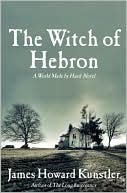 My review of James Howard Kunstler's The Witch of Hebron
My review of James Howard Kunstler's The Witch of Hebron is in a new magazine, Transition Voice, which debuts today.
is in a new magazine, Transition Voice, which debuts today.
Published on October 02, 2010 06:06
October 1, 2010
Yiyun Li on KQED
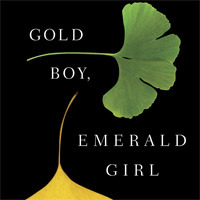 Yiyun Li recently appeared on KQED's Writers' Block program to read the title story from her new collection.
Yiyun Li recently appeared on KQED's Writers' Block program to read the title story from her new collection.The audio is embedded below (thanks to KQED for the tip!)
Published on October 01, 2010 14:30
2011 Press 53 Open Awards
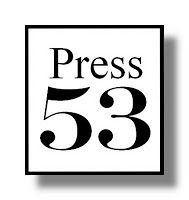
Check out the 2011 Press 53 Open Awards and, more importantly, check out the incredible lineup of judges: Chris Offut judging the short story, Josh Weil judging the novella, Sherrie Flick judging flash fiction, Carolyn Kreiter-Foronda (former poet laureate of Virginia) judging poetry, Stefanie Freele judging the short short story, and Bill Roorbach judging creative nonfiction. That's star-studded.
Published on October 01, 2010 12:51
September 30, 2010
"A Good Man is Hard to Find"
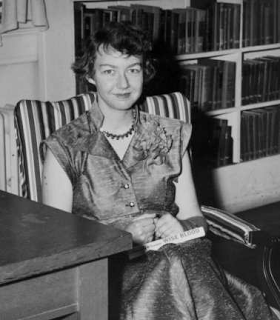 I wrote the syllabus for my composition class in early August. Because of the way holidays and the school's fall break fell, I wanted to fill yesterday's class with something a little out of the ordinary, before we jump into a full-week discussion of a novel next week.
I wrote the syllabus for my composition class in early August. Because of the way holidays and the school's fall break fell, I wanted to fill yesterday's class with something a little out of the ordinary, before we jump into a full-week discussion of a novel next week.So I assigned Flannery O'Connor's "A Good Man is Hard to Find" which is one of several O'Connor stories in our anthology. It turned to be great timing, because I was really too sick yesterday to do much teaching--a bad cold at its peak--and so instead, I played a recording of O'Connor reading the story and also reading an excerpt from her essay about The Grotesque in Southern Literature (which you can find in the Library of America volume of her complete works).
I first heard these recordings this summer at Sewanee and had a little trouble locating them on the internet, but I found them at this blog: The Morning Oil: Flannery! It's pretty special to hear this story in her voice.
Published on September 30, 2010 07:02
September 28, 2010
MacArthur Foundation "Genius Grants"
The so-called "genius grants" were announced today, and included among the 23 recipients named by the MacArthur Foundation was fiction writer Yiyun Li. Screenwriter David Simon was the only other writer in the bunch.
Published on September 28, 2010 12:54
The New Yorker: "The Warm Fuzzies" by Chris Adrian
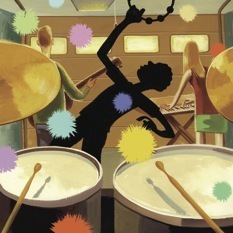 It turns out that the previous Adrian story in The New Yorker, which I liked very much, was an excerpt from the novel that he's now finishing up. It looks like this one, which I like far less, is, too. See the Q&A with Chris Adrian.
It turns out that the previous Adrian story in The New Yorker, which I liked very much, was an excerpt from the novel that he's now finishing up. It looks like this one, which I like far less, is, too. See the Q&A with Chris Adrian.Here we have Molly, the teen daughter of the Carters and a member of the Carter Family Band, a Partridge Family clone that sings Christian-themed songs written by the father. It's a big family that is supplemented by foster kids, currently Paul, who prefers the name Peabo. There apparently has been a long stream of foster kids, and we get the impression that they're always black. This one is fairly compliant—he shakes his tambourine in the band, is polite about the food—but there seems to be a connection between Molly and him. And that gets Paul/Peabo kicked out in a record short time. And it isn't Peabo's fault, really, but Molly looks to be heading that direction as well.
I can't tell you how much I didn't care. The story is too long for such a weak climax and ending. Way too long.
September 27, 2010: "The Warm Fuzzies" by Chris Adrian
Published on September 28, 2010 11:26



